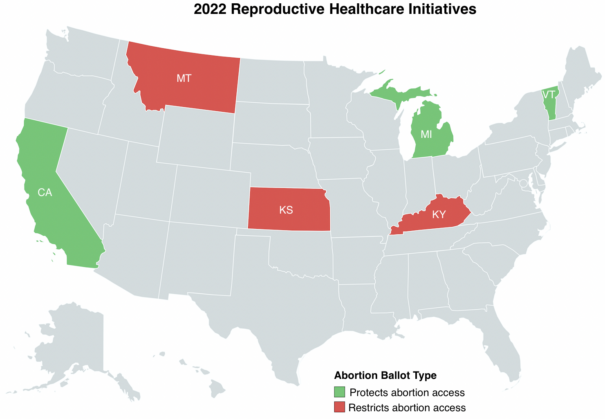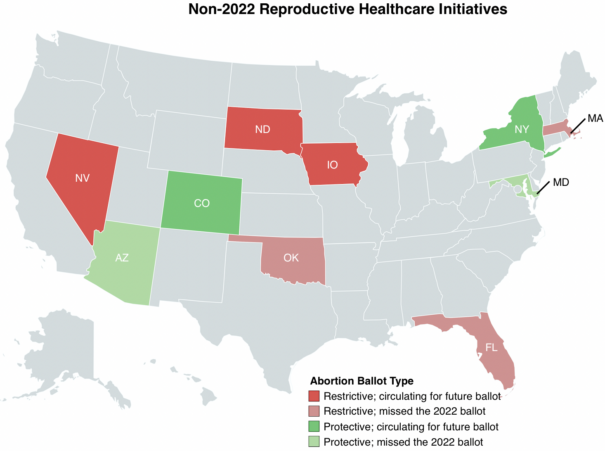This November, voters will decide on reproductive access amendments in six states—the highest number ever for abortion-related ballot initiatives. Three restrict access, while the other three are the first proposals supported by pro-choice organizers since 1992. Restrive abortion amendments have been regularly circulated since 1982. Here are the 2022 ballot measures:

Initiatives on the 2022 Ballot
California
Residents can vote to establish a constitutional right to reproductive freedom, including abortion access and contraception decisions. The vote in state legislatures was split across party lines, but it went through with California’s substantial Democratic majority.
Kansas
A “yes” vote agrees that Kansas’s constitution does not establish a right to abortion nor require the state government to fund them. It also allows the legislature to pass abortion-related laws.
Residents had to be registered to vote by July 12 to vote on the initiative. A 2021 poll found that 61 percent of residents agree that “women are in a better position than politicians” to make their abortion decisions, but it did not ask about the proposed amendment.
Kentucky
This measure would establish that there is no constitutional right to an abortion or its public funding. Voters must be registered by Monday, October 17.
Michigan
Michiganders will decide if a right to reproductive freedom should be guaranteed. The constitutional amendment would prohibit abortion bans prior to fetal viability and in cases of maternal mortality risk. The Right to Reproductive Freedom Initiative enshrines the ability to make and act on “decisions about all matters relating to pregnancy,” including “contraception, sterilization, abortion care, miscarriage management, and infertility care.”
To get on the ballot, the initiative needed 425,059 signatures—10 percent of the votes cast in the gubernatorial election—which it surpassed by more than 300,000. The petition was submitted on July 11 and is expected to be on ballots this November.
Montana
LR-131, dubbed the “Born-Alive Infant Protection Act,” establishes that all live births produce legal residents that must be given medical attention. Providers that do not treat infants born from induced labor, cesearan section, or attempted abortion would face up to $50,000 in fines and 20 years in prison.
In Ohio, no abortion procedures performed past 12-weeks gestation—more than 10 weeks before fetal viability—resulted in “failed abortions.” Montana does not publish abortion data.
Vermont
Proposal 5 would guarantee a constitutional right to “personal reproductive liberty.”

Initiatives that Missed the Ballot
Arizona
As was the case in Michigan, pro-choice activists in Arizona pushed for the Right to Reprdoctive Freedom Initiative to get on ballots this November. The petition amassed only half of the 356,467 signatures needed by July 7.
Florida
A proposal to ban abortions following fetal cardiac activity—around 6-weeks gestation—did not get enough signatures. The petition was approved in 2019.
Maryland
An initiative establishing a right to reproductive freedom, similar to those proposed in Michigan and Arizona, was approved by the House in March but did not reach a vote in the Senate.
Twenty-six days before the May 31 deadline, a separate ballot initiative was circulated to repeal House Bill 937. The legislation expands abortion access by allowing all authorized medical practitioners (like nurse practicioners and physician assistants) to perform the procedure, not just physicians. The veto referendum petition fell short of the 69,135 signatures required.
Massachusetts
The proposal advocated for an amendment saying “nothing in this constitution requires the funding of abortion,” allowing state-sponsored healthcare to opt out of abortion coverage. It began circulating in 2019 but missed the signature deadline that year, ending its path to the 2022 ballot.
Nevada
The initiative required parents or guardians to be notified at least 48 hours prior to their child’s abortion procedure. The petition missed the initial 2020 deadline, blocking it from inclusion on the 2022 ballot.
Oklahoma
A February proposal to grant equal legal rights to “the unborn child” was passed by the Senate but did not reach a vote in the House.
A separate initiative followed the same course, proposing abortion be recognized as a “destructive act that terminates the life of an unborn human being, [and establishing that] nothing in this Constitution secures or protects a right to an abortion.”
Future Proposals
Colorado
Reproductive rights groups want two proposals on the ballot in 2024. One would allow state funding for abortions and the other would incorporate the Reproductive Health Equity Act into the constitution. The Act strengthens reproductive healthcare access and says fetal life does not qualify for personhood.
Conservative lawmakers are pushing for an abortion ban to be added as a ballot initiative in the November election. With a Democratic majority in both chambers of the state’s legislature, it is unlikely the initiative will make it to the ballot.
Iowa
This would establish that the state constitution does not “secure a right to abortion or require [its] public funding.” A poll by the Des Moines Register last year estimated 31 percent of residents oppose the measure, down from 33 percent in 2020.
Nevada
If the petition gets the 140,777 signatures needed by November 23, 2022, Nevadans will vote in 2024 on whether or not parental notification is required prior to a minor’s abortion procedure. A separate initiative following the same process would require parental consent for all medical procedures for minors, including abortion.
New York
The New York Equal Protection Act bans discrimination, including based on “pregnancy, pregnancy outcomes, and reproductive healthcare and autonomy.” The bill passed in the state legislature at the beginning of the month and will be on the ballot in 2023.
South Dakota
A petition proposal approved in June would amend the constitution to legalize abortion without exception until the third trimester, when it would still be allowed if the pregnant person’s health is at risk. It would be on the November 2024 ballot if it meets the 33,921 signature minimum.